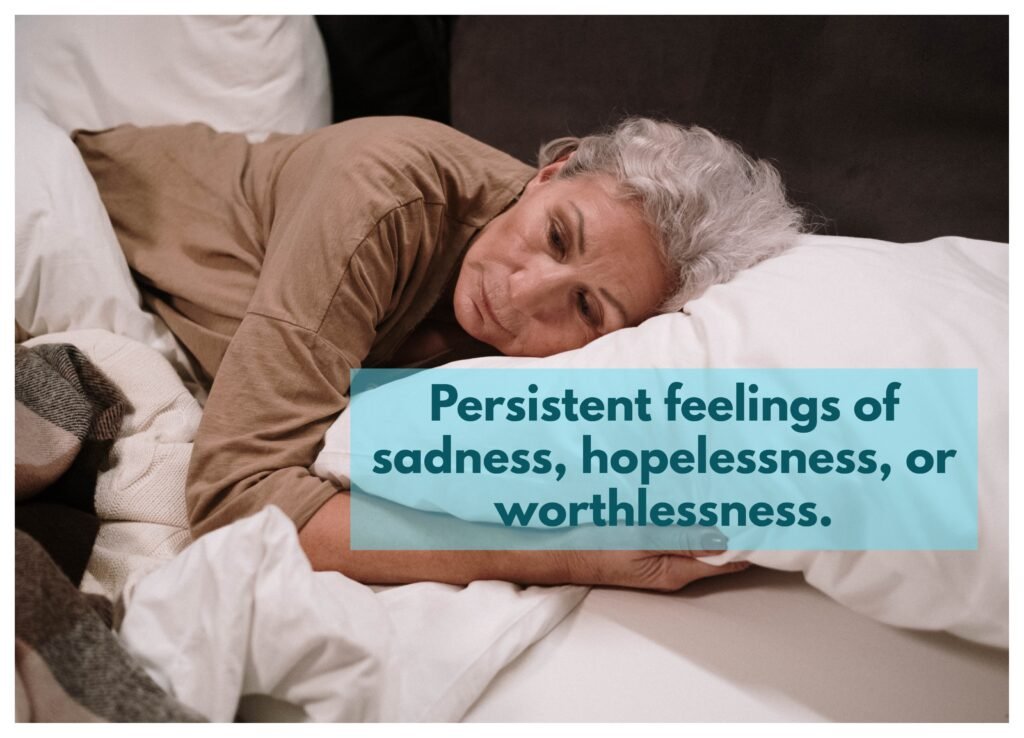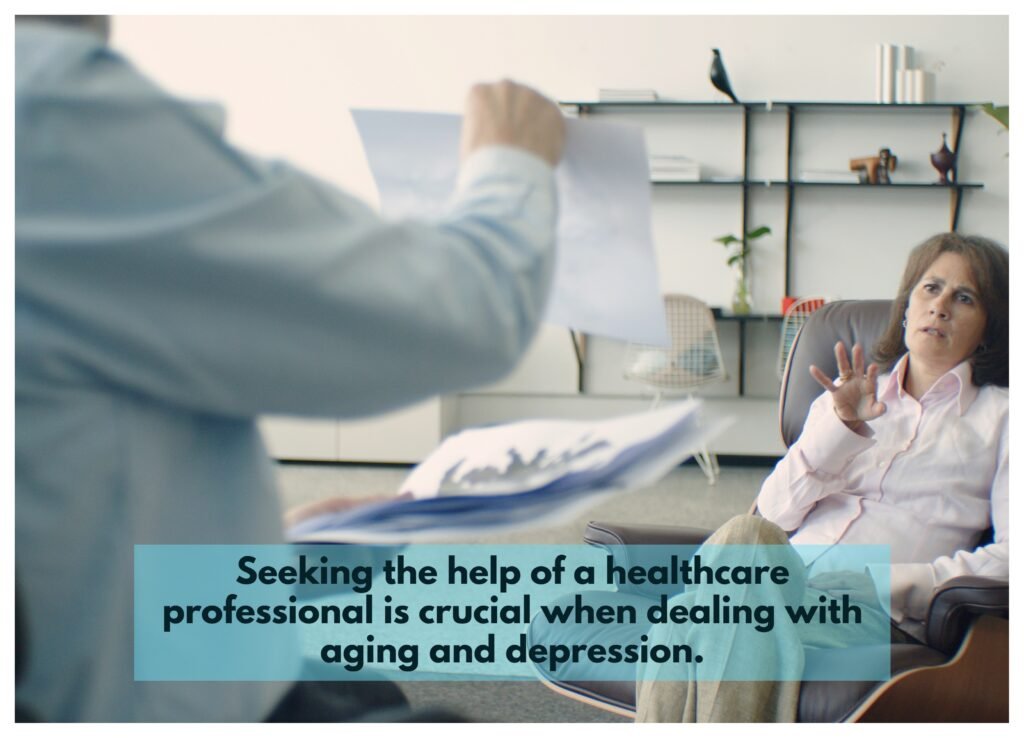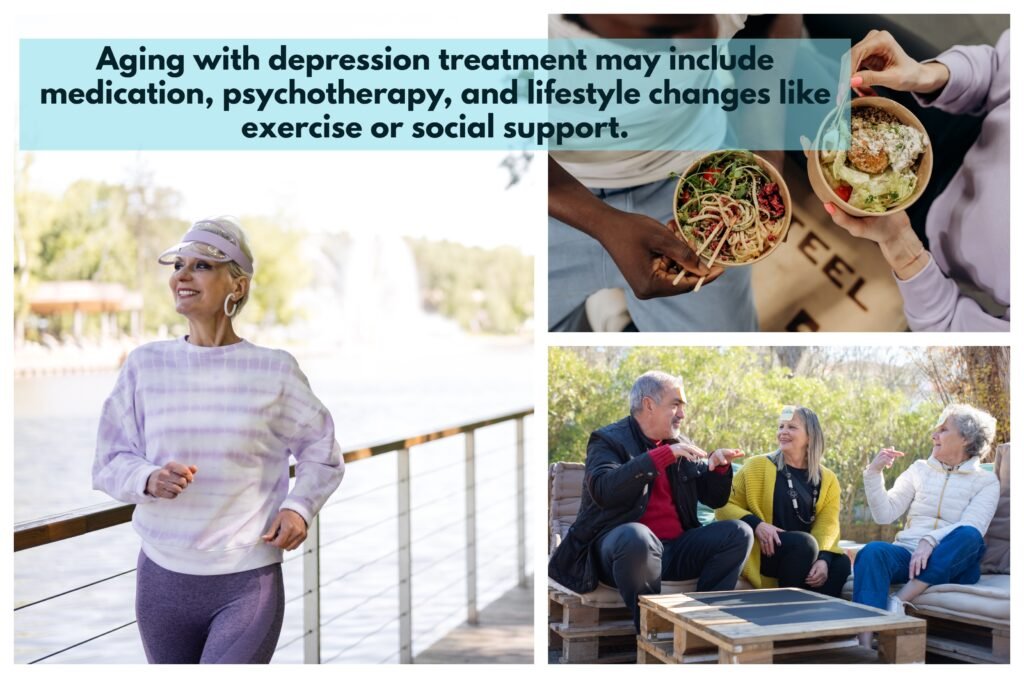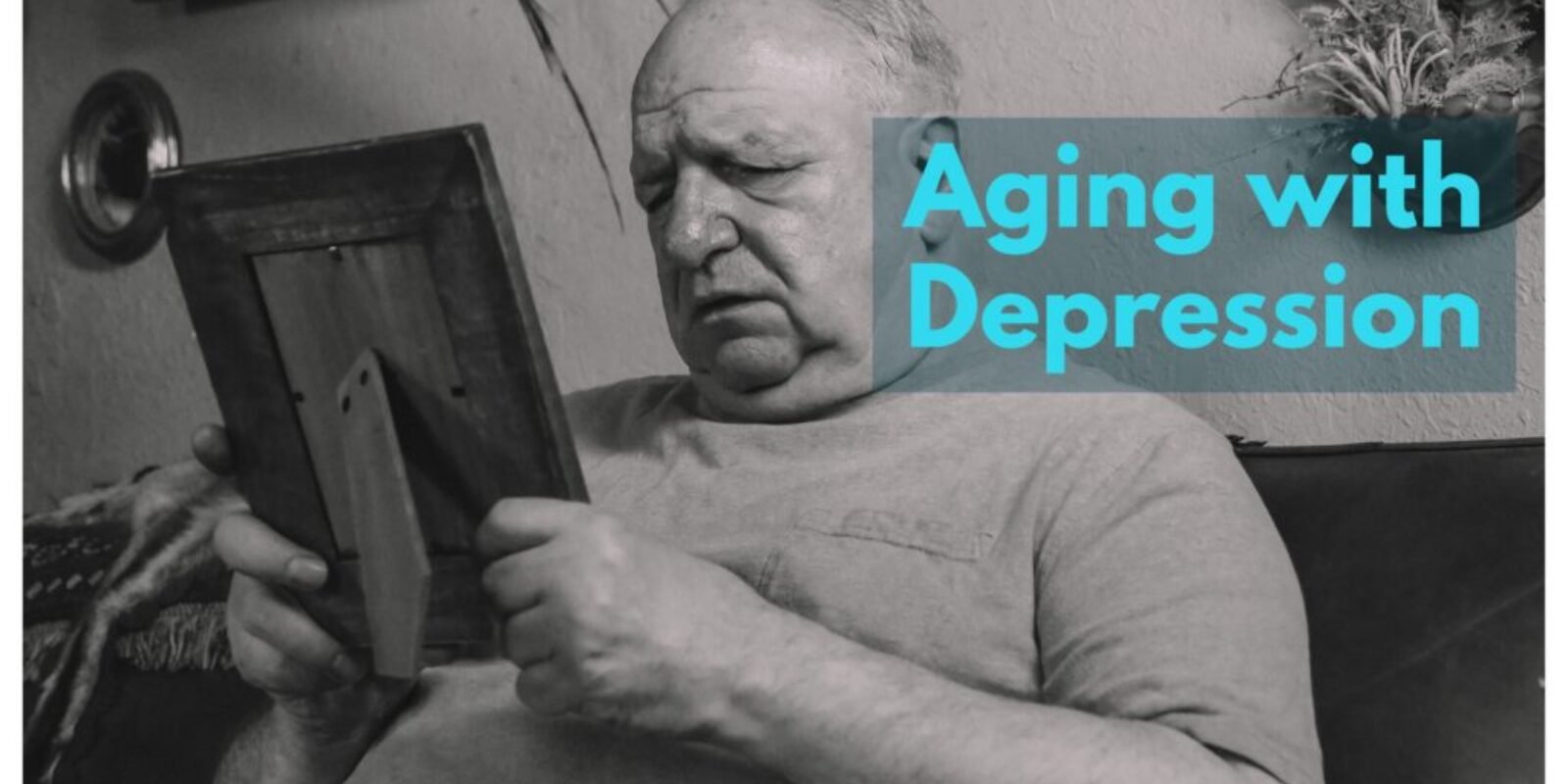Growing older brings its own set of hurdles. Beyond the physical transformations and health hurdles, mental well-being often demands our attention too. While the conversation around mental health typically centers on those in the midst of life’s hustle and bustle, it’s crucial to understand that these concerns span across all ages.
Mental health doesn’t discriminate by age, and the golden years come with their own distinctive challenges. Conditions like depression can hit harder as we age, underscoring the need for a keen awareness of the mental health issues that may emerge. Recognizing and addressing aging with depression concerns is key to ensuring comprehensive care and support during our later years.
Everything You Need to Know about Aging with Depression?
In our previous discussion, we delved into the complexities of combating loneliness as we age. Today’s focus shifts to a similarly crucial aspect of mental well-being: aging with depression. This condition presents unique challenges that demand our attention and understanding. We aim to unpack the mental health hurdles associated with aging with depression and offer practical ways to navigate through these turbulent waters.
We’ll explore the signs and symptoms to watch for, pinpoint the factors that commonly contribute to aging with depression, and highlight the strategies and resources at your disposal for managing this condition. Additionally, you will also know which healthcare providers can help you deal with this condition.
We want to help you understand what aging with depression means so you can deal with it. Our goal is to empower you with knowledge and tools to tackle your mental health proactively so you can age happily and fulfilled.
Prefer to listen rather than read?
What is Aging with Depression?
Aging with depression is a scientifical term of people over 65 suffering from loneliness. This condition doesn’t pick and choose based on age, yet it poses specific hurdles for the elderly, intertwined with various aspects of their lives.
Depression in later years is more than just occasional sadness. It’s a profound, lingering sense of despair, a disinterest in once-pleasurable activities, and noticeable shifts in eating and sleeping habits, alongside difficulty in maintaining focus. For those aging with depression, these emotional struggles are often compounded by physical issues, like ongoing pain or overwhelming fatigue.
The roots of aging with depression are multifaceted, spanning from health declines and the pain of losing close friends or partners to the biting sting of loneliness and significant changes in one’s living environment. Moreover, the older generation might face greater stigma when it comes to discussing mental health, complicating their journey towards seeking necessary support and treatment.
Addressing aging with depression requires a holistic approach. This might include therapy sessions, medication tailored to the individual’s needs, and positive adjustments in daily living habits. Recognizing the signs of aging with depression early on and getting the right help is crucial. Prompt action not only improves quality of life but also opens the door to a more joyful and fulfilling chapter in the later years.
Signs and Symptoms
Aging with depression can cast a long shadow, altering life’s twilight years in profound ways. It’s crucial to spot the signals early, as the journey through aging with depression is marked by both physical and emotional challenges. Here’s what to look out for:
Persistent Sadness and Emotional Turmoil
Central to aging with depression are deep-seated feelings of sadness, hopelessness, and worthlessness. This emotional distress can lead to a heightened sense of isolation and loneliness, hallmark traits of aging with depression. When once joyful social interactions or personal care lose their appeal due to overwhelming despair, it’s a clear signal that depression may be at play.
The Joyless Days
Anhedonia, or the loss of interest in once-loved activities, starkly characterizes aging with depression. This withdrawal can exacerbate feelings of isolation and disconnection, particularly poignant for those navigating the significant life shifts that come with aging, such as retirement or dwindling social circles.
Restless Nights
Aging with depression often brings sleep disturbances — falling asleep can be a struggle, nights may be interrupted, or one might find themselves sleeping too much. Such patterns are especially prevalent among seniors due to age-related changes in sleep architecture and potential health issues, making sleep quality an important marker of aging with depression.
Appetite and Weight Fluctuations
Noticeable changes in eating habits or unexplained weight variations are signals of aging with depression. Whether it’s a diminished appetite or indulging more than usual, these shifts can signify deeper emotional distress.

Exhaustion and Energy Drain
A pervasive lack of energy or fatigue, even for activities that were once manageable or enjoyable, is a frequent companion of aging with depression. Such fatigue is more than just physical tiredness; it’s a depletion of emotional and motivational reserves, making even the simplest tasks daunting.
The Physical Toll
Aging with depression isn’t just an emotional ordeal; it often manifests physically. Chronic pain, headaches, and other somatic complaints are commonly reported, adding another layer of difficulty to daily life for those aging with depression.
Concentration and Decision-making Challenges
Cognitive fog, indecisiveness, and memory troubles are not just signs of aging; they can also indicate aging with depression. These symptoms can further erode one’s sense of control and autonomy, deepening the impact of depression.
Guilt and Self-reproach
Feelings of guilt or self-blame, especially regarding past decisions or current incapacities, are often intensified in those aging with depression. This self-criticism can stem from a multitude of losses experienced in later life, from personal independence to loved ones, feeding into the cycle of depression.
Social Withdrawal and Lost Connections
A stark sign of aging with depression is the retreat from social activities and relationships that were once sources of joy and fulfillment. Seniors might withdraw from family gatherings, skip regular meet-ups with friends, or show a general disinterest in social engagements. This retreat isn’t just about preferring solitude; it’s a symptom of the overwhelming effort it takes to engage while coping with depression.

Irritability and Uncharacteristic Mood Swings
While often overlooked, increased irritability or sudden mood swings can be significant indicators of aging with depression. Seniors might display short tempers over seemingly minor issues or fluctuate between emotional states more rapidly than usual. These changes in mood are not merely signs of age; they reflect the internal struggle of dealing with depression.
Decreased Physical Mobility and Activity
Another sign of aging with depression is a notable decrease in physical activity or mobility not solely attributable to physical ailments. Seniors might start avoiding walks they once enjoyed or show reluctance in attending physical therapy sessions. This decline in activity is a signal of the loss of motivation and energy that accompanies depression.
Neglecting Personal Care and Hygiene
Aging with depression can lead seniors to neglect personal care routines and hygiene practices that were once part of their daily life. Skipping showers, wearing the same clothes for days, or ignoring basic grooming can all be signs that depression is taking a toll.
Resistance to Change or New Situations
An unusual resistance to change or new situations may also indicate aging with depression. Seniors might display a strong preference for routine, showing distress or discomfort when faced with new environments, people, or activities. This resistance often stems from the fear and uncertainty that depression magnifies.
The Shadow of Suicide
Perhaps the most dire signal of aging with depression is an increase in suicidal thoughts or fixation on death. Older adults may feel an intensified sense of despair, prompting critical attention and immediate intervention from family, friends, and healthcare providers.
If you or a loved one is having suicidal thoughts, reach out immediately to a mental health professional or the National Suicide Prevention Lifeline at 1-800-273-8255 or you can also contact 988lifeline. We at My Seniors World emphasize the importance of suicide prevention.

Anxiety and Worry Over Minor Concerns
An increase in anxiety or excessive worry over minor or routine concerns can also be a sign of aging with depression. Seniors might express disproportionate concern over small household tasks, health issues, or financial matters, indicating an underlying depressive state that amplifies everyday anxieties.
Feeling Burdensome to Others
Seniors aging with depression often express feelings of being a burden to their family and friends. This perception can deter them from seeking help or sharing their struggles, further isolating them and deepening the impact of depression.

Lack of Future Planning or Interest in Personal Affairs
A diminished interest in planning for the future or attending to personal affairs can be a subtle yet significant sign of aging with depression. Seniors might show apathy towards financial planning, will preparation, or even planning social visits, reflecting a deeper sense of hopelessness or a lack of interest in life.
Aging with depression paints a complex picture of intertwined physical and emotional symptoms. Recognizing these signs is the first step toward seeking and receiving help. Whether it’s for yourself or someone you care about, reaching out to a healthcare professional can pave the way for effective management and a brighter outlook, even in the face of aging with depression.
Diagnosis and Treatment
Diagnosing aging with depression involves conducting a comprehensive assessment of an older adult’s physical health, mental health, and social support systems to determine the underlying causes. This assessment should involve obtaining an in-depth medical history and performing a comprehensive physical examination.
Depending on the individual’s presentation and medical history, laboratory tests and imaging studies may be indicated to rule out any underlying medical conditions that may be contributing to the person’s depression. A comprehensive psychological assessment should be conducted to evaluate the individual’s cognitive functioning, affective symptoms, and social support systems.
This assessment should include an evaluation of the individual’s current levels of functioning, as well as a review of their past history of depression. Mental health professionals may conduct a thorough psychiatric evaluation to assess the person’s mood, thoughts, and behaviour, and to determine if they are experiencing symptoms of depression.
Treatment for aging with depression may involve a combination of medication, psychotherapy, and lifestyle changes, such as exercise or social support.
Medication:
- Antidepressants can be useful in treating depression in older adults, but they may require some adjustments to the dosage and monitoring of side effects. As we grow older, our bodies may become more sensitive to the effects of medications, including antidepressants.
- Therefore, older adults may require lower doses of antidepressants to achieve the same therapeutic effect as younger adults. Older adults may also experience more side effects from antidepressants, such as dizziness, dry mouth, constipation, and confusion.
- This is why they may require more frequent monitoring for side effects, to ensure that they are not experiencing any adverse reactions to the medication.
Psychotherapy
- CBT is a practical and goal-oriented approach that focuses on changing negative thought patterns and behaviours. This form of therapy can help individuals develop coping strategies and improve problem-solving skills.
- The therapist works with the individual to challenge negative thoughts and help them see situations in a more positive light. With practice, a person can learn how to manage their thoughts and emotions more effectively, leading to a reduction in depressive symptoms.
- IPT, on the other hand, takes a different approach by focusing on interpersonal relationships. This form of therapy recognizes that depression is often linked toproblems in relationships and social interactions, and aims to address these issues through therapy sessions.
- IPT is based on the idea that depression can be triggered by interpersonal stressors, such as the loss of a loved one, conflict with others, or social isolation. The therapy aims to help individuals identify and address these stressors, and develop healthier ways of relating to others. The therapist works with the individual to improve communication skills, resolve conflicts, and enhance social support networks.
Exercise
- Regular exercise can also have positive effects on mental health and cognitive function. Exercise has been shown to improve mood, reduce symptoms of anxiety and depression, and improve cognitive function, including memory and executive function.
- Exercise can also improve social connectedness and reduce feelings of loneliness and social isolation in older adults. Group exercise classes or fitness activities can provide opportunities for older adults to socialize and connect with others who have similar interests and goals.
Social Support
- Staying socially connected is important for older adults, as social isolation and loneliness can have negative effects on both physical and mental health. Encouraging older adults to maintain connections with family, friends, and support groups can help them stay engaged, active, and supported.
Nutrition
- Eating a balanced diet with plenty of fruits, vegetables, and whole grains can help older adults maintain physical and mental health. Older adults should aim to consume sufficient protein to maintain muscle mass, which can help prevent falls and other health problems.
- It’s important to work with a healthcare provider or registered dietitian to determine specific nutritional needs based on individual health conditions and lifestyle factors.
Avoid Alcohol and Drugs
- Older adults may be more susceptible to the harmful effects of drugs and alcohol due to changes in their body’s ability to metabolize and eliminate these substances. As we age, our liver and kidneys may not function as efficiently, which can lead to a buildup of substances in the body.
- In addition, many older adults may be taking multiple medications to manage chronic health conditions, which can increase the risk of drug interactions and side effects. Alcohol can also interact with certain medications, making them less effective or increasing the risk of harmful side effects.
- Substance use can worsen symptoms of depression, anxiety, and other mental health conditions, and can also increase the risk of falls and other accidents.

Treating aging with depression requires a great deal of patience and understanding from both the patient and the medical professional. With the right treatment plan, however, there is hope for individuals experiencing aging with depression.
Reframing Our Outlook on Life
In order to combat depression, it is important to look for ways to reframe our outlook on life. Aging does not have to mean an end to joy and fun. Instead, it can be a time to explore and experience new things. Consider finding ways to stay active and engaged such as joining a community organization or participating in meaningful activities.
Additionally, keep track of the things that bring joy and make sure to incorporate them into daily life. This can be anything from going to the museum to having a cup of tea. Taking time to enjoy the little things and remind yourself of why life is worth living is important in combatting aging with depression.
Finding Joy in Getting Older
Finding joy in growing older involves recognizing what brings meaning and purpose to one’s life. Aging can be a time to reflect on one’s values and priorities and to commit to activities that bring fulfilment and satisfaction. This can include pursuing hobbies or interests that may have been put on hold during other life stages or engaging in activities that provide a sense of purpose, such as volunteering or mentoring others. Consider learning new skills to find new pursuits through our friends at Skill Share to further find a fulfilling goal.
It’s important to take time to reflect on past accomplishments and experiences, both big and small. Celebrating past successes can provide a sense of pride and accomplishment, and help individuals feel more confident and positive about their current and future prospects. Remembering joyful moments and experiences can also provide a sense of gratitude and contentment.
Additionally, staying engaged with friends and family can bring joy and meaning to life. Maintaining social connections and staying involved in social activities can help older adults feel connected to others and engaged in the world around them.
Overall, finding joy in growing older involves recognizing what brings purpose and meaning to life, and committing time and energy to activities that provide fulfilment and satisfaction. By staying engaged with hobbies, pursuing new interests, and staying connected with loved ones and the community, older adults can maintain a positive outlook and find joy and purpose in their golden years.
Creating an Age-Friendly Support System
Creating an age-friendly support system is important for older adults who are struggling with mental health challenges like depression. A strong support system can provide emotional support, companionship, and a sense of connection and belonging.
Family members and close friends can be important sources of support, but it’s also important to reach out to mental health professionals, support groups, and other organizations that can provide specialized support and resources. Mental health professionals can provide counselling, therapy, and other treatments for depression, while support groups can provide opportunities for peer support and advice.
Participating in age-friendly activities and organizations can also help older adults build a strong support system. Activities like exercise classes, art classes, and community service groups can provide opportunities for socializing and connecting with others who share similar interests.
In addition, many communities offer resources specifically for older adults, such as senior centres, community centres, and volunteer organizations. These organizations can provide opportunities for social engagement, learning, and personal growth. Creating an age-friendly support system can help older adults manage depression and maintain their overall well-being.
By reaching out to family members, friends, mental health professionals, and age-friendly organizations, older adults can build a strong network of support that can provide comfort, encouragement, and assistance during difficult times.
Conclusion
In conclusion, aging with depression can be a difficult and overwhelming challenge. However, it doesn’t have to be a burden that you carry with you for the rest of your life. With the right resources and support, you can learn to cope and manage your condition.
It is important to remember that you are not alone in your battle and that there are plenty of opportunities to find help. With the right treatment plan, you can overcome this challenge and age with confidence and peace of mind. If you or your family member are showing these signs, go ahead and see your doctor ASAP.
Disclaimer
The content provided on MySeniors.World is for informational purposes only and is not intended as either financial or medical advice. Always consult a qualified professional before making any investment or health-related decisions.
Posts may contain affiliate links, meaning we earn a commission – at no additional cost to you, if you click through and make a purchase. Your support helps us continue providing valuable content.



















